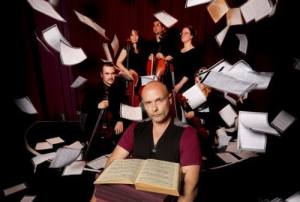 Last December, as part of the Melbourne Ring Festival, Melbourne Opera presented the Australian premiere of Rienzi, Wagner’s first big operatic success. Reviewer Heather Leviston was there for ClassicMelbourne – and was impressed.
Last December, as part of the Melbourne Ring Festival, Melbourne Opera presented the Australian premiere of Rienzi, Wagner’s first big operatic success. Reviewer Heather Leviston was there for ClassicMelbourne – and was impressed.
Now Melbourne Opera presents another chance to hear Rienzi in concert on 5 Februrary 5, 7.30pm at the Athenaeum Theatre. Check details after you read Heather’s comprehensive review that reveals why this is an event not to be missed!
Review
8 December 2013
Melbourne Opera Chorus and Orchestra
Conductor: Greg Hocking
Athenaeum Theatre, Melbourne
Reviewer: Heather Leviston
Three and a half stars
Rienzi was a hit in its day, firmly placing Wagner on the operatic map with its first performance in Dresden in 1842.
From the time that Meyerbeer facilitated its performance in Dresden, it has been the subject of controversy. Rejected by the Paris Opera, Wagner’s initial foray into Grand Opera has been referred to as Meyerbeer’s best opera – and his worst. Even in Dresden, a sticking point resulted in substantial cuts to an opera longer than any of the Ring operas. With the full scores having been lost, shortened reconstructions have been the norm. Since Wagner himself wrote a number of shortened versions and the opera seemed to be a kind of work in progress, no sense of desecration accompanied the three hour version presented by Melbourne Opera.
A concert version avoids being weighed down by problematic direction and staging; the focus of attention is on the music and the quality of its performance. Even so, the dramatic content of an opera is important and an absence of surtitles meant that the story itself could only be followed in the most general way for those unfamiliar with the opera. In this case it would have been most of the audience, although the Overture and Rienzi’s Prayer are familiar standard repertoire. Nevertheless, the performers gave vocally dramatic accounts of their roles, conveying their spirit if not all the details.
The role of Cola di Rienzi, a late medieval Roman revolutionary, is notoriously demanding and one of the reasons why the opera is so rarely performed. Although this version was in abbreviated form, Jason Wasley still had to contend with a substantial amount of the punishingly high tessitura before coming to one of the most famous heldentenor arias at the beginning of Act 5. Wasley’s voice does not have quite the weight of a typical heldentenor but it carried well over the orchestra and more than held its own in the ensembles. His warm, appealing tone invested his characterization with sincerity and a suitably heroic quality.
As Rienzi’s sister, Irene, Joanna Cole was superb. She possesses a beautiful voice with thrilling power and has the ability to spin the loveliest soft line at the top of her range. Her duets with Rosamund Illing, in the trousers role of Adriano Colonna, were a real highlight and enough to make one wish for more frequent performances of this opera or at least excerpts from it. The two sopranos were well matched in terms of substance and power and engagement with the drama of the piece. The role of Adriano is sometimes sung by a mezzo-soprano with a fuller sound in the lower notes, but whatever substance Illing may have lacked in her lower register was more than compensated for in the ease and power of her top notes. Accustomed to Wagner as a through composer, without the usual big arias begging for applause, the audience felt restrained from doing so until her Act 3 aria, where Adriano is torn between his love for Irene and his loyalty to his family. Enthusiastic applause interrupted and followed her passionate singing of this wonderful aria. In the final scene, as Adriano, Rienzi and Irene perish while the Capitol collapses in flames around them, Illing’s immersion in her role was vocally and dramatically rivetting.
There was not one weak link in a formidable line-up of established professionals and rising stars filling the other roles. Adrian Tamburini, Manfred Pohlenz, Matthew Thomas, Sam Sakker, Roger Howell and Anne-Louise Cole all gave strong performances. In particular, Sam Sakker impressed as a young tenor to be watched.
The chorus is an unusually important component of Rienzi and the Melbourne Opera Chorus gave rousing accounts of the many numbers that required lusty singing. Some of the quieter and more demanding passages depended on the confidence and secure vocal technique of a couple of extremely able sopranos, but in general the chorus was well balanced and disciplined.
A smallish orchestra can hardly do justice to Wagner’s lush instrumentation so it came as no surprise that greater depth of tone was needed at various points. The extra brass used for this occasion was a welcome addition to make the beginning of Act 3 an exciting call to arms. There was also some notable work coming from the trumpet and horn sections throughout the opera.
Despite certain compromises, this performance brought a great deal of satisfaction. Melbourne Opera is to be highly commended for providing an audience of Wagner lovers, comprising locals as well as interstate and overseas visitors who were here for the main Ring event, with a rare opportunity to hear a major neglected work. This performance of Rienzi was dedicated to the memory of two much loved, recently deceased luminaries of the operatic stage: bass-baritone Robert Allman and director Elke Neidhardt.
